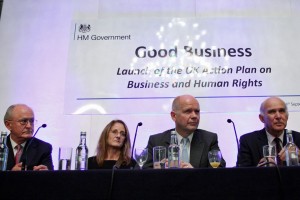William Hague – 2013 Speech on Business and Human Rights
Below is the text of the speech made by William Hague, the then Foreign Secretary, on 4 September 2013.
Good evening ladies and gentlemen. It gives me great pleasure to join the Business Secretary and our distinguished guests to launch the UK’s Action Plan on Business and Human Rights, and I can think of no better place to do it than here at the Institute of Directors – an organisation which does a great deal to promote the corporate integrity which is at the heart of this Plan.
You are here because we all share the same goal, which is to ensure that British companies succeed and that they do so in a manner that is consistent with this country’s deeply held values of human rights and individual dignity.
In 1948 the UN General Assembly called on “every individual” and “every organ of society” to respect the rights and freedoms enshrined in the Universal Declaration of Human Rights.
Today, the duty to uphold those rights cannot be the responsibility of governments alone. We live in a world where open markets and more equitable trading rules mean that British companies – large or small, public or private – are increasingly transnational; where it’s not unusual for our companies to purchase materials from Bangkok manufacture products in Bangalore, sell them in Bogota; and we live in a world where legal standards and practices for working conditions and the treatment of staff may differ from country to country.
Today, business and government have to work together. The vast majority of companies, I believe, understand the moral imperative of respecting human rights, and they are active in ensuring that they do exactly that. This isn’t about imposing burdensome bureaucracy on them; it’s about Britain leading the way and the British Government helping our businesses to enhance their international reputations even further.
The truth is that incorporating human rights properly into business operations across the world matters:
It matters to companies, as weaving human rights deeply into corporate cultures not only protects and enhances reputations, but it also reassures shareholders, attracts investors, and increases the attractiveness of their brands.
It matters to the reputation of this country and the prosperity of its people.
And, perhaps most of all, it matters to the health, safety and livelihoods of employees, and the communities to whom they belong.
That is why I believe that promoting business and respecting human rights are two sides of the same coin, and which determined that the UK will show leadership on this issue, and which all the ambassadors here will be telling their countries we did so, I am sure.
So I am proud that we are the first country to present a National Action Plan for implementing the UN Guiding Principles developed by former Special Representative of the Secretary General, John Ruggie, who I am delighted to have with us this evening.
This Action Plan responds to calls from business for greater clarity by setting out explicitly what the Government’s position is on business and human rights.
It details this Government’s plans to implement our obligations to protect against human rights abuse by business enterprises within UK jurisdiction; to support our companies in meeting their responsibility to respect human rights throughout their operations at home and abroad; to provide access to effective remedy for victims of human rights abuse; to promote understanding of how addressing human rights risks can help build business success; and to ensure policy consistency across the British Government and all its departments But the plan also outlines the Governments expectations of business, such as complying with all applicable laws; honouring the principles of internationally recognised human rights when faced with conflicting requirements; adopting appropriate due diligence policies; consulting those who may be affected at all stages of project design and implementation; emphasising to supply chains in the UK and overseas the importance of behaving in line with the UN Guiding Principles; and participating in effective grievance mechanisms that are transparent, equitable and predictable.
Launching the Plan today is just the beginning. We now need to take on the more challenging task of ensuring that it’s implemented with consistency.
To do this, we need business leaders to work with us and to highlight challenges, and I urge companies to use the expertise that we have in our Embassies, High Commissions, and Consulates, who are standing ready to help you enact the Plan.
We need those civil society groups who have contributed so much to developing this Action Plan to continue holding us to account and to lend your expertise to the companies that need it.
We need our partners overseas to follow the UK’s lead and to develop their own Plans, so that we can generate real international momentum behind improving the rights of all people affected by business activity in all countries.
And, for our part, we are determined to continue showing leadership by lobbying and influencing other states to follow this example, and by working together with British businesses to ensure that we achieve nothing short of comprehensive implementation of the UN Guiding Principles.
That’s our objective, and the Foreign and Commonwealth Office, its Ministers, and its overseas network will do everything to ensure that this Action Plan lays a strong foundation for the long-term success and sustainability of British business.



